

Kenya is a growing hub for startups in Africa, attracting billions in funding. From 2021 to mid-2024, startups raised over $2 billion, fueled by innovations in fintech, e-commerce, healthcare, and clean energy. Key investors like Savannah Fund, Chandaria Capital, and Novastar Ventures are driving this growth by providing early-stage funding and strategic support.
Quick Highlights:
- Savannah Fund: Focuses on early-stage tech startups with investments from $50,000 to $1M.
- Chandaria Capital: Supports scalable ventures in sectors like retail tech, healthcare, and energy.
- Novastar Ventures: Invests $100,000 to $5M in underserved markets, emphasizing agriculture and healthcare.
- Kepple Africa Ventures: Prioritizes fast decision-making with investments up to $150,000.
- Factor[e] Ventures: Concentrates on climate tech and mobility with seed funding up to $750,000.
- Africa Tech Ventures (ATV): Backs tech-driven solutions with investments up to $5M.
- E3 Capital: Focuses on digitization, decentralization, and decarbonization with a $150M fund.
- Safaricom Spark Fund: Provides up to $500,000 per startup, leveraging Safaricom’s infrastructure.
- Yunus Social Business: Combines financial support with social impact, targeting underserved communities.
- Acumen Fund: Tackles poverty through long-term investments in energy, agriculture, and education.
Why It Matters:
Kenya’s startup ecosystem thrives due to high internet penetration (87%), financial inclusion (83%), and innovations like M-PESA. These investors are not only funding startups but also shaping the future of tech and social impact in the region.
Looking for funding? Focus on scalable tech, market validation, and measurable impact to attract these top investors.
| Business NOW | Attracting Startup Funding
1. Savannah Fund
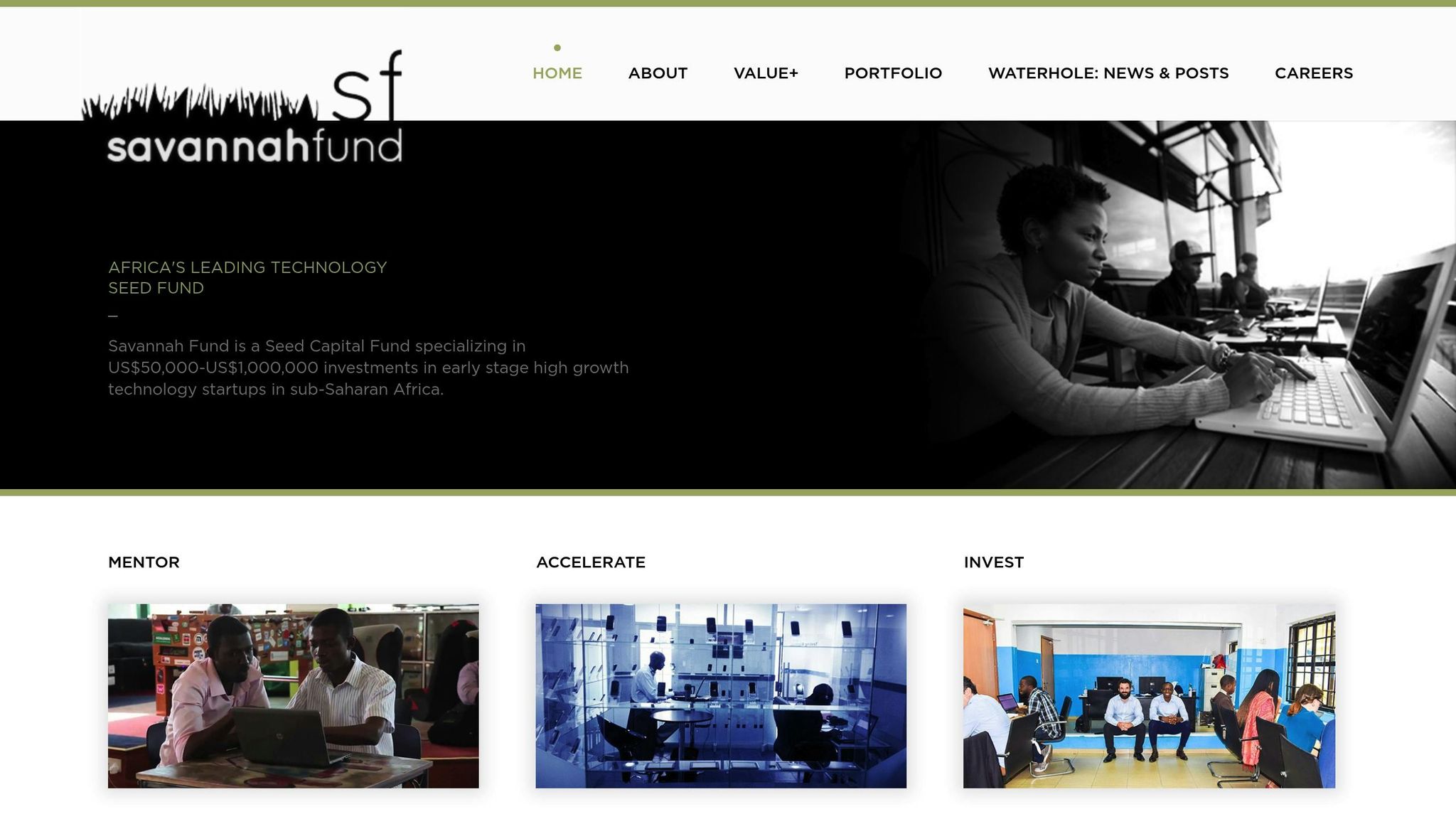
Savannah Fund is a venture capital firm based in Nairobi, focusing on early-stage tech startups across sub-Saharan Africa. Since 2012, it has invested between $50,000 and $1 million in various tech businesses.
The firm looks for startups with the potential to grow regionally and globally, particularly in sectors like fintech, agtech, e-commerce, edtech, enterprise, healthcare, and logistics. Initial investments typically range from $150,000 to $250,000, though pre-seed funding can start as low as $50,000.
Here’s a breakdown of their investment amounts by stage:
| Investment Stage | Typical Amount |
|---|---|
| Pre-seed | $50,000 |
| Seed | $150,000 – $250,000 |
| Series A | Up to $1,000,000 |
Savannah Fund’s investments have driven growth for several standout companies:
- Eneza Education: An edtech platform providing courses via SMS/USSD to over 800,000 students in Kenya, Ghana, and Tanzania as of January 2024.
- Copia Global: An assisted online purchase platform in Kiambu that raised $123 million, including a $20 million Series C round in December 2023.
- Sendy: A logistics company and one of Savannah Fund’s notable investments in Kenya.
“Early-stage funding is vital to enable more of Africa’s emerging and growing tech founders to grow their business and fuel the transformation of Africa’s internet economy. By partnering with Savannah Fund, we can help more entrepreneurs to access funding.” – Kevin Njiraini, IFC regional director for Southern Africa and Nigeria
With a portfolio of 39 companies, including 10 based in Kenya, Savannah Fund plays a critical role in addressing the early-stage funding gap in Africa’s growing digital economy.
2. Chandaria Capital
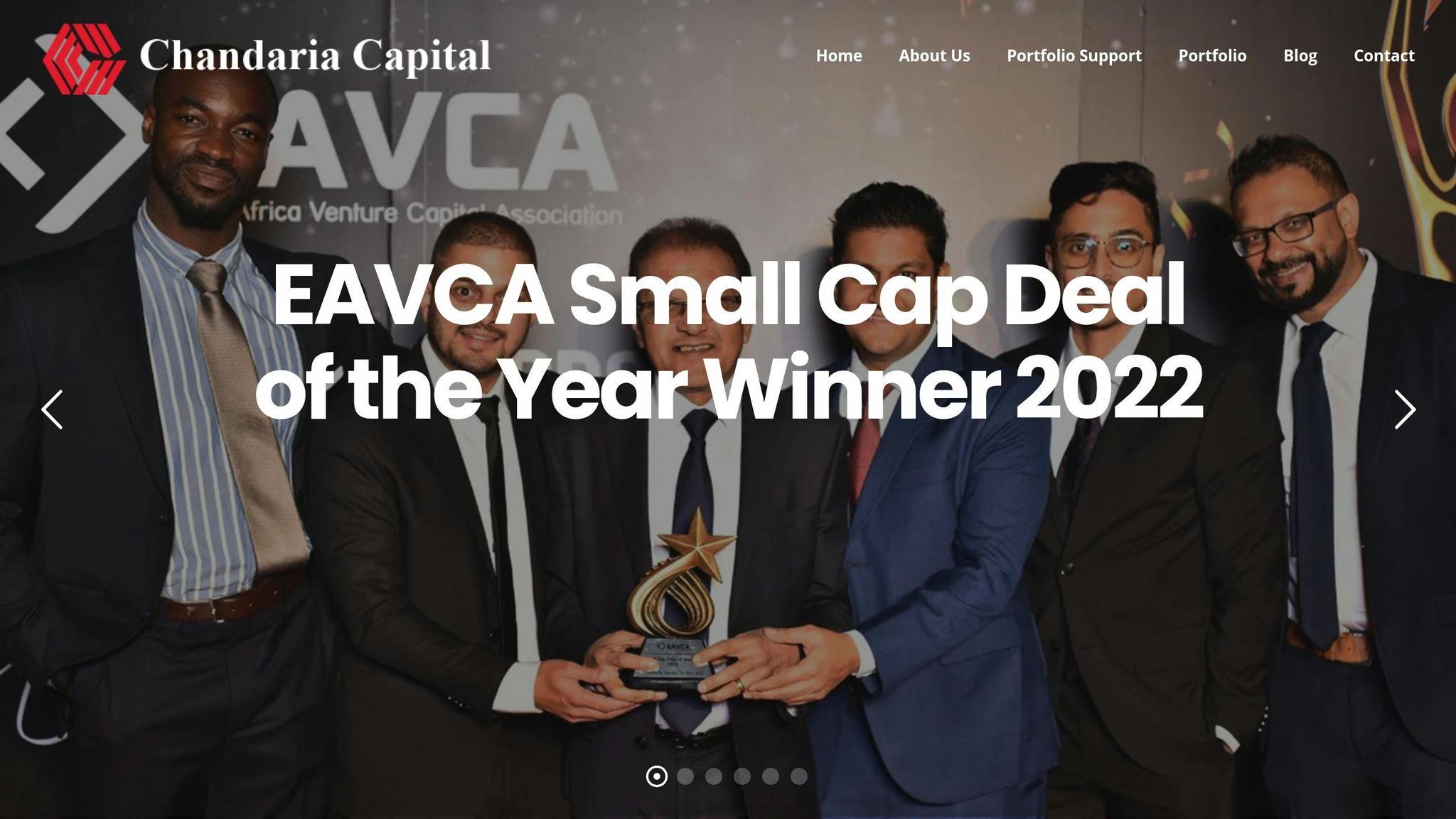
Chandaria Capital, based in Nairobi and founded by Darshan and Neer Chandaria, focuses on early-stage investments in promising African businesses. By supporting scalable and competitive ventures, the fund plays a key role in driving growth within Kenya’s startup scene.
The fund’s portfolio covers a wide range of industries, including:
| Company | Sector | Description |
|---|---|---|
| Sokowatch | Retail Tech | Lets informal retailers order products via SMS or a mobile app with same-day delivery |
| Mobius Motors | Automotive | Designs and builds vehicles tailored for Africa’s mass market |
| KOKO Networks | Energy | Offers affordable ethanol-based fuel solutions |
| Ilara Health | Healthcare | Provides accessible and affordable diagnostic services |
| Jumba | Construction Tech | Streamlines construction processes across the continent |
Chandaria Capital doesn’t just provide funding. It also offers hands-on support in areas like business development, hiring, marketing, technology, customer acquisition, and planning for exits.
“Chandaria Capital has been a great partner for us in growing Sokowatch. From introducing us to new partners to helping us recruit the best talent, Chandaria has leveraged their extensive network across East Africa to support our growth across the region.”
– Daniel Yu, Founder & CEO, Sokowatch
Their influence goes beyond individual companies. For example, their partnership with Metta Kenya has helped strengthen the entrepreneurial community in the region.
“Chandaria Capital has definitely been one of our rock-star investor members! Excited to continue working with this team as we grow our entrepreneurial space to the next level.”
– Esther Mwikali, Head of Community, Memberships & Operations, Metta Kenya
Through global connections, Chandaria Capital also links Kenyan startups to international expertise and potential partners. This global reach has proven especially helpful for companies like Mobius Motors.
3. Novastar Ventures

Novastar Ventures stands out for its commitment to supporting underserved communities. Established in 2014, this Nairobi-based venture capital firm focuses on early-stage investments across East Africa.
With investments ranging from $100,000 to $5 million, Novastar has built an impressive portfolio, including:
| Company | Sector | Investment Details |
|---|---|---|
| Komaza | Agriculture | $9.9M Series A (Nov 2017), $28M Series B (Jul 2020) |
| mPharma | Healthcare | $12M Series B (Mar 2019), $30M Series D (Jan 2022) |
| Max.ng | Transportation | $6M Series A + $1M grant (Jun 2019), $31M Series B (Dec 2021) |
| Trade Depot | SaaS | $42M Series B (Dec 2021) |
| BasiGo | Transportation | $4.3M Seed (Feb 2022) |
These investments target key sectors critical to Kenya’s growth. Beyond funding, Novastar actively works with businesses to develop models that address the needs of East Africa’s growing middle class. With offices in Kenya, Nigeria, and London, the firm connects local startups to global networks.
Novastar’s investments focus on several key areas:
- FinTech: Backing ventures like Turaco ($2M seed round) and TeamApt.
- AgTech: Supporting companies like GreenPath Food with $1M in Series A funding.
- Digital Infrastructure: Funding Poa Internet’s $28M Series C to expand affordable internet access.
- Clean Energy: Investing in PayGo Energy’s $1.4M seed round.
4. Kepple Africa Ventures

Kepple Africa Ventures, launched in December 2018, manages a $13 million fund supported by Japanese high-net-worth individuals. The firm focuses on early-stage investments ranging from $50,000 to $150,000.
With offices in Nairobi and Lagos, the firm prioritizes quick decision-making. Co-founder Ryosuke Yamawaki highlights their philosophy:
“We invest when nobody else believes in it. We are not afraid of making mistakes; but we fear not learning anything due to lack of execution and speed.”
This mindset drives their investments across various sectors in Kenya:
| Sector | Notable Investments | Stage |
|---|---|---|
| Healthcare | TIBU Health, Access Afya | Growth |
| EdTech | Zydii | Startup |
| Clean Energy | KOKO Networks | Growth |
| HR Tech | Workpay | Early-stage |
| InsurTech | mTek | Early-stage |
Yamawaki also notes:
“Other markets are saturated; Africa offers untapped potential due to limited professional capital.”
Kepple Africa Ventures stands out with its fast decision-making, ability to connect across borders, and focus on building industries. Through its Verod-Kepple Africa Ventures (VKAV) initiative, the firm now supports larger investments between $1 million and $3 million, while staying committed to early-stage funding.
5. Factor[e] Ventures
![Factor[e] Ventures](https://assets.seobotai.com/techinafrica.com/67ef9f34ebbb9dc80642882b/3643f056d7c6e92011f0eb174b0dde28.jpg)
Factor[e] Ventures focuses on backing early-stage tech companies tackling major challenges in emerging markets. They offer seed funding ranging from $250,000 to $750,000, and 85% of their portfolio companies secure additional funding later on.
Key Investment Sectors
The firm zeroes in on four main sectors, each with measurable outcomes:
| Sector | Focus Areas | Impact Metrics |
|---|---|---|
| Energy | Clean tech, grid solutions | 5.8M metric tons of GHG reduction |
| Agriculture | AgTech, supply chain | Boosts primary GDP contributions |
| Water | Resource management | Benefits over 115M livelihoods |
| Mobility | Transportation, logistics | 1,626 direct jobs created |
To expand its climate-focused initiatives, Factor[e] Ventures launched Delta40, a venture studio based in Nairobi. Led by Lyndsay Holley Handler, Delta40 specializes in building climate-tech startups. So far, it has partnered with experienced founders to launch six ventures.
“Although only 3% of global carbon emissions come from Africa, more than 60% of African households will be affected by climate change if we do not act.”
Portfolio Highlights
Factor[e] Ventures has built an impressive track record:
- 36 investments across 44 countries
- 8 successful exits
- $511 million in leveraged capital
- 88% of deals were first-mover opportunities
- 34 hardware and software innovations
The firm provides more than just funding. Through initiatives like Factor E Labs, they offer technical expertise, market insights, and strategic guidance to help startups navigate the complexities of emerging markets.
“Factor E has a unique understanding of what it takes to build successful products in emerging markets, and their expertise has been invaluable in helping Odyssey navigate complex environments and establish key connections. We hold Factor E close to our hearts for believing in our vision from the very beginning and continuing to support us through our growth and transformation.”
Delta40 also strengthens Factor[e] Ventures’ footprint in Kenya by connecting African and female founders with the resources – technology, talent, and capital – they need to build impactful climate-tech ventures.
sbb-itb-dd089af
6. Africa Tech Ventures
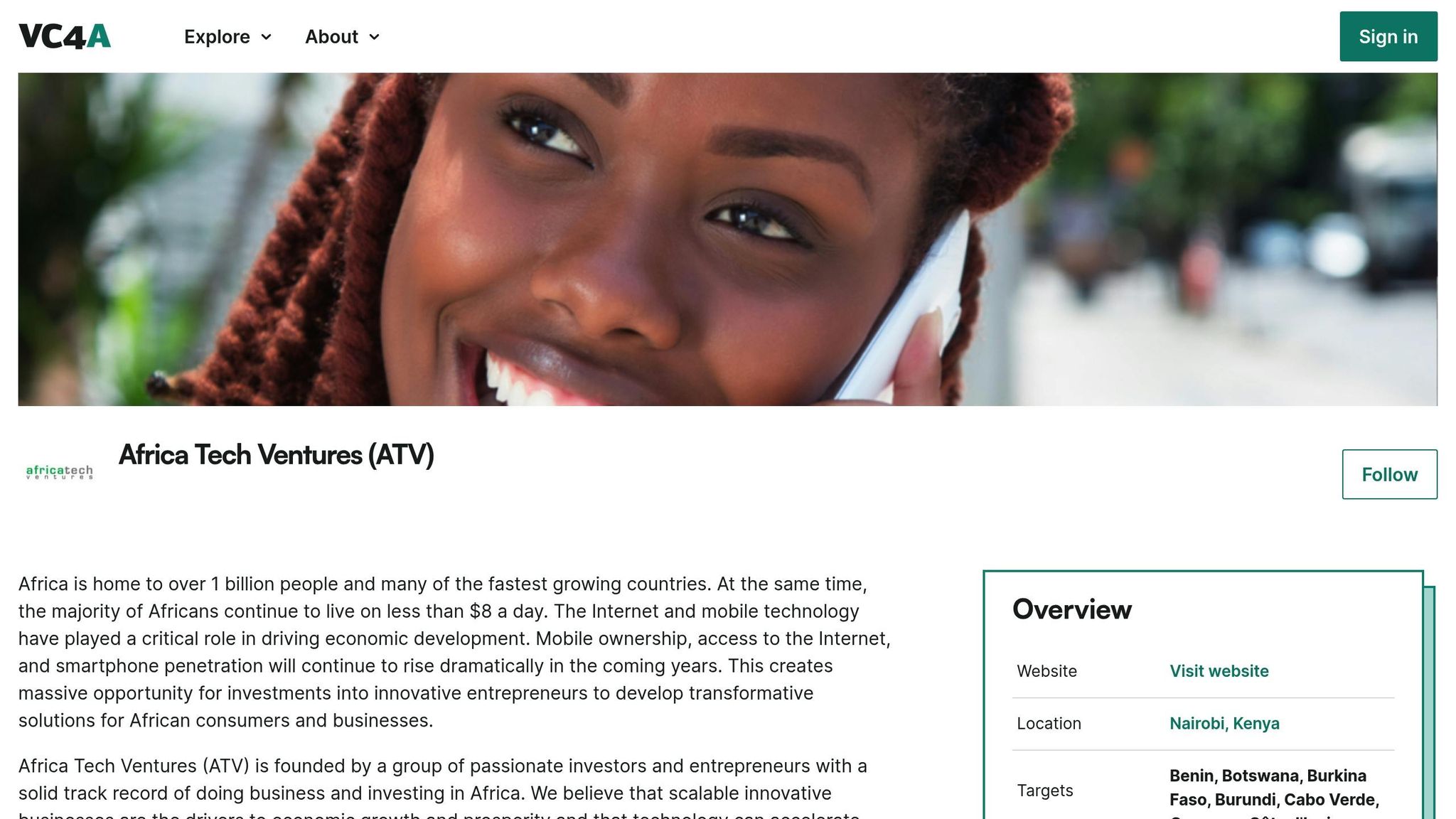
Africa Tech Ventures (ATV) plays a key role in Kenya’s startup scene, offering investments ranging from $100,000 to $5 million in exchange for a minority stake. They also provide follow-on funding to help businesses scale. ATV focuses on startups that use technology to boost economic growth and improve access to essential services across Sub-Saharan Africa.
Investment Focus Areas
ATV prioritizes three key sectors in Kenya:
| Sector | Investment Focus | Goals |
|---|---|---|
| EdTech | Digital learning platforms | Expand access to quality education |
| HealthTech | Healthcare delivery solutions | Make healthcare more accessible |
| ICT | Business automation & connectivity | Improve market access and financial inclusion |
These areas align with ATV’s mission to drive growth and create meaningful change in critical industries.
Strategic Approach
ATV’s investment strategy is built on two main pillars:
- Consumer Access – Expanding access to essential goods and services for people across Africa.
- Business Solutions – Supporting startups that help businesses reach new markets and integrate financial tools.
This approach positions ATV as a valuable partner for entrepreneurs addressing market challenges with tech-driven solutions.
Investment Structure
ATV’s funding model supports startups at different stages of growth by offering:
- Initial investments starting at $100,000
- Growth funding up to $5 million
- Follow-on funding to fuel further expansion
- A minority equity stake, paired with strategic partnership opportunities
This structure ensures startups receive the financial and strategic support they need to thrive.
7. E3 Capital
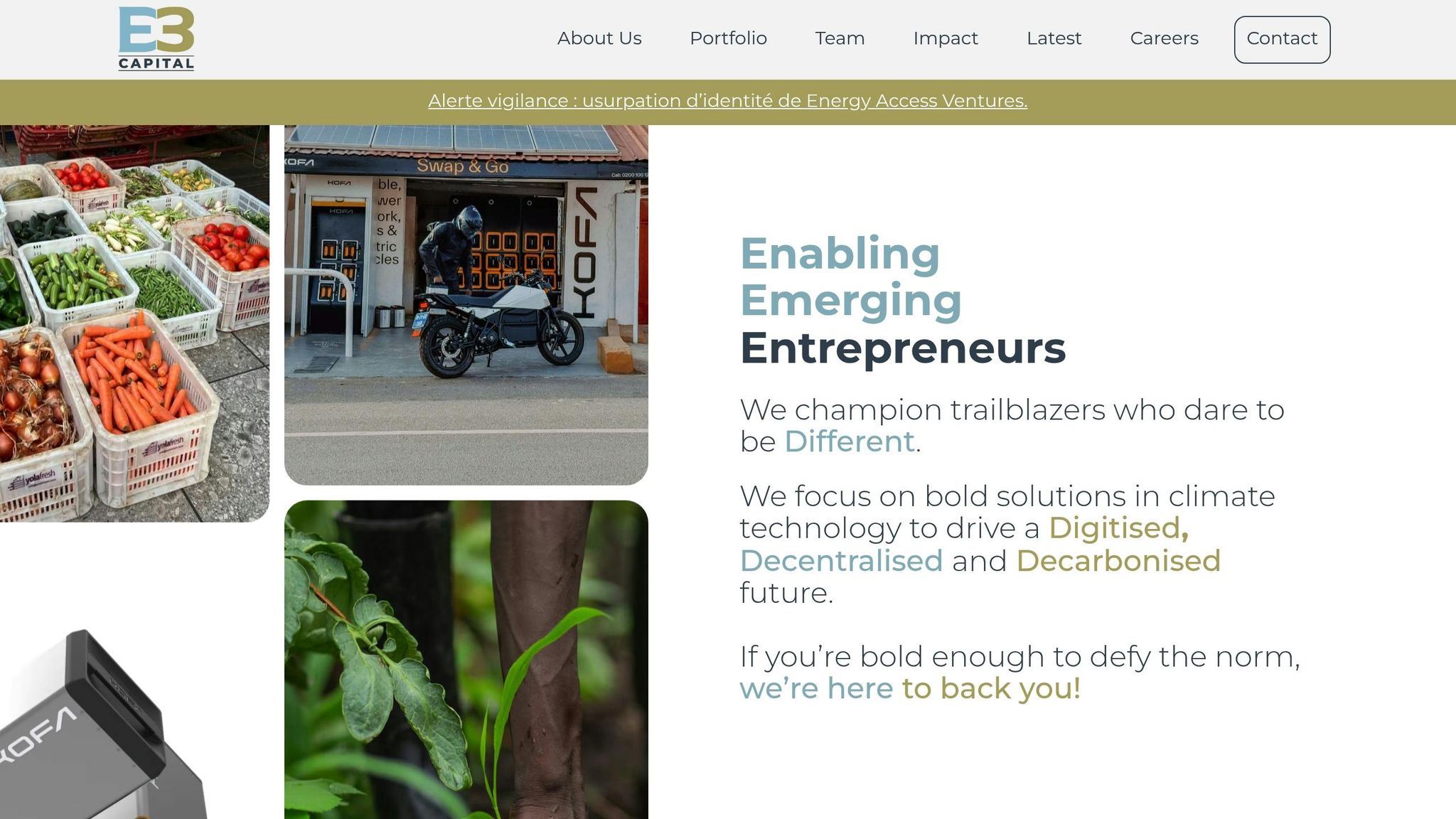
E3 Capital plays a key role in driving Kenya’s tech development, with a focus on funding climate technology and sustainable solutions. The firm has raised $150 million and built a portfolio spanning 22 countries.
Investment Philosophy
E3 Capital backs early-stage companies that align with three main principles:
- Digitization
- Decentralization
- Decarbonization
This approach has created over 3,814 direct jobs and helped avoid 181,244 tonnes of CO₂ emissions.
Focus Industries
E3 Capital channels its investments into sectors that aim to create measurable impact. Here’s a breakdown:
| Sector | Investment Areas | Impact Goals |
|---|---|---|
| Clean Energy | Solar power, energy storage | Expand renewable energy, cut emissions |
| AgTech | Irrigation, farming tech | Boost agricultural efficiency |
| Digital Infrastructure | Internet access, tech solutions | Improve connectivity |
| Green Mobility | Electric transport, logistics | Lower transportation emissions |
These areas reflect the firm’s commitment to impactful investment strategies.
Notable Investments
-
Mawingu Networks: Received funding in February 2023 to deliver affordable internet access through solar-powered access points.
“E3 Capital has been a phenomenal partner in Mawingu’s journey – providing not just capital, but invaluable strategic guidance and support in fundraising. Their deep expertise and commitment to growth have been instrumental in shaping our vision and scaling our impact.”
- SunCulture: Focuses on solar-powered irrigation tools for farmers in East Africa.
-
Badili Africa: Secured investment in April 2024.
“E3 Capital’s investment came at a pivotal point for Badili. Paras and team have always been there to support and were proactive in helping us raise additional capital right after their investment.”
Impact Metrics
E3 Capital’s investments have achieved the following:
- Reached 21 million people
- Supported 4 million households
- Assisted 1,600 businesses
- Generated 16 MW of energy
- Prevented 144 million tonnes of CO₂ emissions
8. Safaricom Spark Venture Fund
Safaricom’s Spark Venture Fund plays a key role in supporting early-stage tech companies in Kenya. By offering financial and strategic backing, the fund has grown from an initial $1 million allocation in 2014 to $5 million by 2020.
Investment Strategy
The fund invests up to $500,000 per startup, focusing on tech ventures with strong growth potential. In its first round of investments (2015–2017), the average investment per startup was $175,000.
How the Fund Supports Startups
The Spark Venture Fund provides assistance through three main areas:
| Support Type | Details | Key Advantage |
|---|---|---|
| Financial Backing | Direct investments up to $500,000 | Offers critical funding for growth |
| Business Resources | Access to Safaricom’s infrastructure | Builds on an established network |
| Technical Guidance | Mentorship and expert advice | Promotes long-term success |
This comprehensive support system has contributed to the success of several startups.
Success Stories from the Portfolio
During its first investment phase (2015–2017), the fund backed several promising companies, including:
- Sendy
- Lynk
- Ajua
- iProcure
- Farmidrive
- Eneza
Vision and Commitment
“Innovation is part of Safaricom’s DNA, and this latest initiative illustrates the commitment and passion that we have to help nurture a vibrant ICT-powered economy. The Spark Fund demonstrates the existing benefits that Safaricom would be able to offer to start-ups we will invest in order to grow and scale them.”
– Nzioka Waita, Corporate Affairs Director and member of the Board of Trustees for the Fund
“Despite contributing to over 60 percent of Kenya’s GDP, small businesses are under-funded and do not have access to the same level of advice as their counterparts in other countries. It is encouraging that Safaricom will also extend access to structured mentoring to beneficiaries of the Venture Fund as that will be an additional assurance that the selected ventures remain sustainable in the long run.”
Driving Growth in Tech
“We see this as a much-needed catalyst that will help actualize our aspiration to nurture a vibrant ICT economy in Kenya. It will directly address the key startup and developers’ pain points such as the cost and speed of accessing a platform where they can test their solutions.”
This targeted approach is helping to drive growth and innovation across Kenya’s tech ecosystem.
9. Yunus Social Business

In Kenya, Yunus Social Business (YSB) is making waves by combining financial support with meaningful social change. Globally, YSB has touched the lives of 13 million people and boosted incomes for 75,000 individuals. This effort aligns with Kenya’s growing focus on impactful investments.
Investment Strategy and Impact
YSB supports social businesses in the “missing middle” – ventures that balance social goals with financial viability. In Kenya, they teamed up with the IKEA Foundation to map the local impact-investing landscape, working with 50 impact investors and over 150 social enterprises.
| Impact Area | Achievement | Scale |
|---|---|---|
| Climate Action | CO₂ Emissions Averted | 47 million tons |
| Economic Impact | Lives Impacted | 13 million people |
| Income Generation | People Supported | 75,000 individuals |
This work dovetails with Kenya’s push for sustainable tech solutions across industries.
Notable Investment: BURN Manufacturing
YSB’s first Kenyan investment, BURN Manufacturing, has delivered impressive results since September 2019:
- Designed energy-efficient cookstoves that cut fuel use by 60%
- Saved Kenyan families approximately $100 (Ksh15,000) annually
- Prevented over 2.6 million tons of wood from being burned
- Created jobs for 230+ people, with women making up more than half the workforce
“BURN is a fantastic first investment for YSB Kenya as they are truly an impact-first business, covering the spectrum of not only social but environmental and economic impact. The social business is committed to keeping their manufacturing within Kenya in their state-of-the-art factory and are encouraging female empowerment as all jobs are open to both men and women at all levels – just over half of its workforce are women.”
– Saskia Bruysten, CEO, Yunus Social Business
Investment Philosophy
YSB follows the vision of Nobel laureate Muhammad Yunus, prioritizing businesses that serve a cause. Investors can recover their initial funds, but profits are reinvested to achieve social goals.
“Social business is a cause-driven business. In a social business, the investors/owners can gradually recoup the money invested, but cannot take any dividend beyond that point. Purpose of the investment is purely to achieve one or more social objectives through the business.”
– Muhammad Yunus
Regional Impact
YSB’s efforts extend beyond individual projects, fostering growth across East Africa. Their investments and partnerships have positioned Kenya as a hub for social business innovation, particularly in clean energy and environmental conservation. The success of BURN Manufacturing highlights Kenya’s leadership in producing improved cookstoves.
10. Acumen Fund
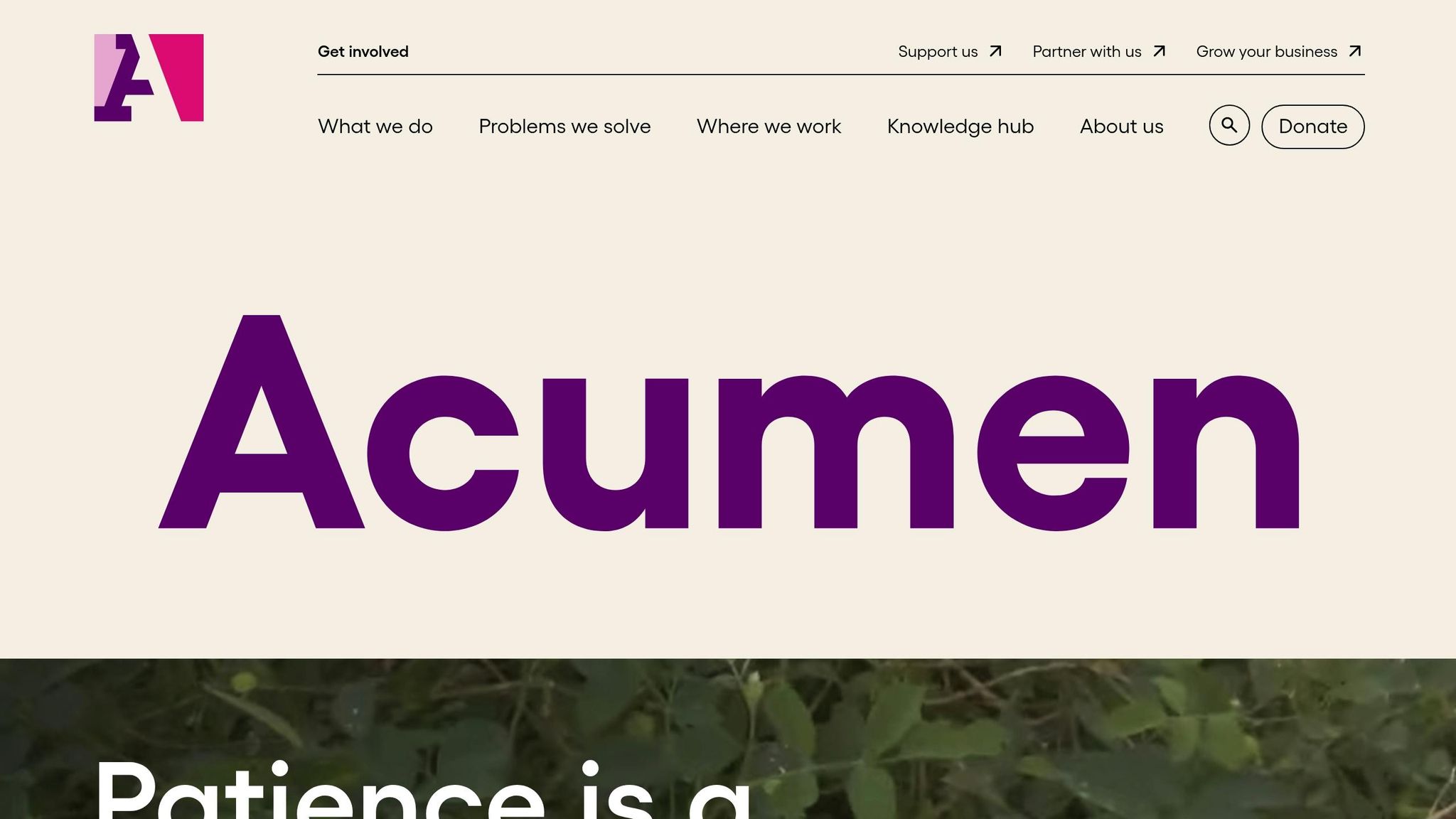
Acumen Fund has played a key role in Kenya’s startup ecosystem by investing millions to tackle poverty through market-driven solutions. Their focus areas include agriculture, clean energy, and education. Using a “Patient Capital” approach, they prioritize long-term social impact alongside financial returns. Below is a closer look at their investments and the outcomes they’ve achieved.
Investment Portfolio and Impact
Acumen’s investments target sectors that drive meaningful change:
| Sector | Company | Impact |
|---|---|---|
| Clean Energy | BURN Manufacturing | Improves energy efficiency |
| Education | Akili Network | Launched Kenya’s first free children’s learning TV channel |
| Agriculture | SokoFresh | Cuts post-harvest losses |
| Sanitation | Sanergy | Serves 95,000 daily users, processing 70,000 tons of waste annually |
Recent Investment Highlights
In 2024, Acumen invested in Keep IT Cool, a project aimed at supporting smallholder farmers in Turkana. This initiative also integrates refugee communities into the poultry supply chain, aligning with their Forcibly Displaced People (FDP) Lens Investing program.
Educational Technology Focus
Acumen has made strides in Kenya’s education sector with targeted investments:
- Ed Partners: Offers infrastructure loans to low-cost private schools.
- Zeraki Analytics: Provides schools with tech-based tools to analyze performance.
These investments are helping to modernize and elevate the quality of education in the region.
Agricultural Innovation
In agriculture, Acumen backs projects that improve livelihoods for farmers:
- Kentaste: Works with smallholder coconut farmers to source premium products.
- Aquarech: Introduces digital tools for aquaculture operations on Lake Victoria.
These initiatives complement their broader efforts in clean energy and sustainable development.
“When markets work for everyone, people in poverty have the power to transform their lives. We build these markets by training better leaders and investing in better businesses.” – Acumen
Clean Energy Initiatives
Through KawiSafi Ventures, a $70 million fund, Acumen has expanded clean energy access across East Africa. Their investment in d.light has improved the quality of life for 97% of its customers and helped offset 38 million tons of CO₂.
Summary
The investors mentioned above continue to drive Kenya’s startup growth by funding sectors like fintech, agriculture, clean energy, and healthcare.
Investment Trends and Impact
These investors employ a range of strategies, from early-stage funding to growth financing, targeting areas such as fintech, e-commerce, AgTech, healthcare, clean energy, education, and agriculture. Their efforts have solidified Kenya’s reputation as a top innovation hub.
Key Success Factors
Entrepreneurs looking for funding should focus on:
- Market Validation: Prove your product fits the market with strong customer adoption.
- Scalable Technology: Develop solutions that can expand across East Africa.
- Social Impact: Highlight measurable contributions to development goals.
These principles are paving the way for new opportunities in Kenya’s evolving market.
Emerging Investment Opportunities
Areas with growing potential include:
- Climate-focused technologies
- Digital health solutions
- Platforms promoting financial inclusion
Guidance for Entrepreneurs
To attract investors, startups should:
- Align with Investment Focus: Tailor your business model to fit the investor’s strategy. For example, Savannah Fund backs early-stage tech startups, while Acumen Fund emphasizes social impact.
- Understand the Market: Provide clear evidence of market opportunity and your competitive edge, including growth metrics and market size.
- Show Results: Share performance data like revenue growth, customer acquisition costs, retention rates, and unit economics.
These strategies can help entrepreneurs successfully navigate Kenya’s competitive funding environment.
Related posts
- 10 African Tech Investors to Watch in 2025
- Top 7 African Tech Hubs Building Communities
- Top 5 Startups to Watch in South Africa in 2025
- Top 5 Startups to Watch in Kenya in 2025
The post 10 Top Investors in Startups in Kenya appeared first on Tech In Africa.









